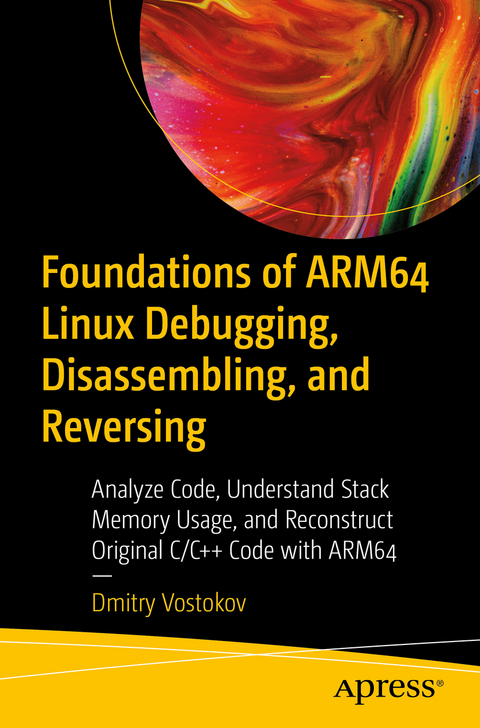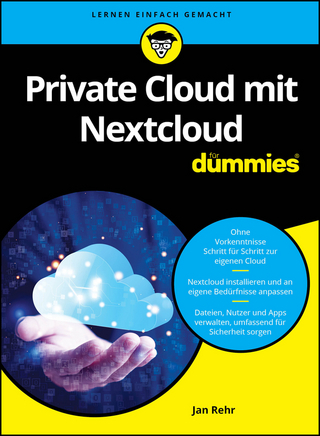
Foundations of ARM64 Linux Debugging, Disassembling, and Reversing
Apress (Verlag)
978-1-4842-9081-1 (ISBN)
Using the latest version of Red Hat, you'll look closely at the foundations of diagnostics of core memory dumps, live and postmortem debugging of Linux applications, services, and systems. You'll also work with the GDB debugger and use it for disassembly and reversing. This book uses practical step-by-step exercises of increasing complexity with explanations and many diagrams, including some necessary background topics. In addition, you will be able to analyze such code confidently, understand stack memory usage, and reconstruct original C/C++ code.
And as you'll see, memory forensics, malware, and vulnerability analysis, require an understanding of ARM64 assembly language and how C and C++ compilers generate code, including memory layout and pointers. This book provides the background knowledge and practical foundations you’ll need to understand internal Linux program structure and behavior.
Foundations of ARM64 Linux Debugging, Disassembling, and Reversing is the perfect companion to Foundations of Linux Debugging, Disassembling, and Reversing for readers interested in the cloud or cybersecurity.
What You'll Learn
Review the basics of ARM64 assembly language
Examine the essential GDB debugger commands for debugging and binary analysis
Study C and C++ compiler code generation with and without compiler optimizations
Look at binary code disassembly and reversing patterns
See how pointers in C and C++ are implemented and used
Who This Book Is ForSoftware support and escalation engineers, cloud security engineers, site reliability engineers, DevSecOps, platform engineers, software testers, Linux C/C++ software engineers and security researchers without ARM64 assembly language background, and beginners learning Linux software reverse engineering techniques.
Dmitry Vostokov is an internationally recognized expert, speaker, educator, scientist, inventor, and author. He is the founder of the pattern-oriented software diagnostics, forensics, and prognostics discipline (Systematic Software Diagnostics), and Software Diagnostics Institute (DA+TA: DumpAnalysis.org + TraceAnalysis.org). Vostokov has also authored books on software diagnostics, anomaly detection and analysis, software and memory forensics, root cause analysis and problem solving, memory dump analysis, debugging, software trace and log analysis, reverse engineering, and malware analysis. He has over 25 years of experience in software architecture, design, development, and maintenance in various industries, including leadership, technical, and people management roles. In his spare time, he presents various topics on Debugging.TV and explores Software Narratology, its further development as Narratology of Things and Diagnostics of Things (DoT), Software Pathology, and Quantum Software Diagnostics. His current interest areas are theoretical software diagnostics and its mathematical and computer science foundations, application of formal logic, artificial intelligence, machine learning, and data mining to diagnostics and anomaly detection, software diagnostics engineering and diagnostics-driven development, diagnostics workflow, and interaction. Recent interest areas also include cloud native computing, security, automation, functional programming, and applications of category theory to software development and big data. He is based out of Dublin, Ireland.
Chapter 1 - A64.1: Memory, Registers, and Simple Arithmetic.- Chapter 2 - A64.2: Code Optimization.- Chapter 3 - A64.3: Number Representations.- Chapter 4 - A64.4: Pointers.-Chapter 5 - A64.5: Bytes, Half Words, Words, and Double Words.- Chapter 6 - A64.6: Pointers to Memory.- Chapter 7 - A64.7: Logical Instructions and PC.- Chapter 8 - A64.8: Reconstructing a Program with Pointers.- Chapter 9 - A64.9: Memory and Stacks.- Chapter 10 - A64.10: Frame Pointer and Local Variables.- Chapter 11- A64.11: Function Parameters.- Chapter 12 - A64.12: More Instructions.- Chapter 13 - A64.13: Function Pointer Parameters.- Chapter 14 - A64.14: Summary of Code Disassembly Patterns.
| Erscheinungsdatum | 02.02.2023 |
|---|---|
| Zusatzinfo | 45 Illustrations, black and white; XIV, 170 p. 45 illus. |
| Verlagsort | Berkley |
| Sprache | englisch |
| Maße | 155 x 235 mm |
| Themenwelt | Mathematik / Informatik ► Informatik ► Betriebssysteme / Server |
| ISBN-10 | 1-4842-9081-X / 148429081X |
| ISBN-13 | 978-1-4842-9081-1 / 9781484290811 |
| Zustand | Neuware |
| Haben Sie eine Frage zum Produkt? |
aus dem Bereich


